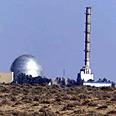
Israel: Signing NPT won't prevent nuclear armament
After US urges Israel to sign anti-nuclear arms pact, Foreign Ministry official says 'it is hard to understand insistence on treaty that has proven its inefficiency'; professor: Americans aware that Israel signing document is unrealistic. Foreign Ministry spokesman says 'no change in close dialogue with Washington'
An Israeli official on Wednesday criticized a US call to sign the nuclear Non-Proliferation Treaty (NPT) as hard to understand, citing the pact's failure to prevent countries from obtaining nuclear arms.
"It is therefore hard to understand why there should be such an insistence on a treaty that has proven its inefficiency," a senior official at the Israeli Foreign Ministry said, after US Assistant Secretary of State Rose Gottemoeller urged Israel, India, Pakistan and North Korea to join the treaty.
The Israeli official said the treaty had not stopped Israeli adversaries such as Iraq and Libya from trying to obtain nuclear potential, adding that "its effects on Iran have (also) failed to meet the eye".
Israel and the West regard Iran's nuclear program as a potential threat, although Tehran insists its purpose is to produce nuclear energy.
"This miracle cure (NPT) has not prevented any country from acquiring nuclear arms, as we can see in the case of Iran," the official said.
"We are still trying to verify (Gottemoeller's) statement. In any case, we are baffled by the US' insistence that (Israel sign the NPT)."
Israel does not confirm or deny foreign reports it has what arms control experts assume to be a sizeable atomic arsenal.
Gottemoeller said on Tuesday, the second day of a two-week meeting at the United Nations of the 189 signatories of the global pact, that "universal adherence to the NPT itself, including by India, Israel, Pakistan and North Korea ... remains a fundamental objective of the United States".
She did not say whether Washington planned new steps to press Israel on the issue.
Professor Gershon Steinberg, head of Bar-Ilan University's Political Science Department, told Ynet that "it would be a serious mistake on Israel's part to make an issue of Gottemoeller's comments. The US is bound by the treaty, and it strives for a nuclear-free world, but the Americans are aware that Israel signing the document is unrealistic."
However, Uzi Even, a former Knesset member and scientist at the nuclear reactor in Dimona, said the statement by the assistant secretary of state is indicative of a change in the US' policy towards Israel regarding its nuclear capabilities.
"In the past there was an informal agreement between the US and Israel; the Americans knew Israel possessed nuclear arms but looked the other way," he said, "now the US breaching this agreement.
"In turn, Israel must change its vague nuclear policy; the reactor in Dimona can be placed under international supervision, thus allowing Israel to sign the treaty as a country that is permitted to develop nuclear arms."
Meanwhile, Foreign Ministry spokesperson for Israeli media Yossi Levy said in response to the report, "The relationship with the US is intimate and of a rare quality, and we have no doubt that it will remain as such in the future as well.
The assistant secretary of state's comments reflect the American creed that we are familiar with regarding adding more countries to the treaty. For a specific interpretation of the assistant secretary's statement, I suggest we ask our American friends. From our standpoint, there is no change in the close dialogue we have with Washington."
Reuters and Anat Shalev contributed to the report










